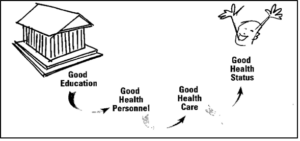Article Type: Editorial
Title: Social accountability in medical schools
Year: 2022; Volume: 2; Issue: 4; Page No: 1 – 2
![]() https://doi.org/10.55349/ijmsnr.20222412
https://doi.org/10.55349/ijmsnr.20222412
Affiliation: Deputy Editor-In-Chief, International Journal of Medical Sciences and Nursing Research, Coimbatore, Tamil Nadu, India and Associate Professor, Department of Epidemiology and Public Health, College of Medicine and Health Sciences, Sohar, National University of Science and Technology, Sultanate of Oman.
Email ID: DeputyEditor-in-chief@ijmsnr.com
Article Summary: Submitted: 26-October-2022; Revised: 14-November 2022; Accepted: 02-December-2022; Published: 31-December-2022
Full Text
Introduction
There is an increasing demand for accountability especially social accountability in all sectors and medical education is no different. The need for accountability in health sector (medical education, health systems and other stakeholders including communities) has been emphasized by the World Health Organization in its Goal of “Health for all. [1]
The World Bank defines accountability as the obligation of authorities / organizations to account for or take responsibility for their actions. [2] The term social accountability refers to the involvement of the civic society in the execution of this obligation by organizations. Social accountability has been recognized as an important mechanism for improving governance, stimulating development and encouraging empowerment.
The World Health Organization in 1995 defined social accountability for medical schools as “the obligation to direct their (medical schools) education, research, and service activities towards addressing the priority health concerns of the community, region, and/or nation they have a mandate to serve. The priority health concerns are to be identified jointly by governments, health care organizations, health professionals and the public”. [3]
Medical Schools and Social Accountability:
Medical schools are an important stakeholder for improving the health of the community and the WHO statement on social accountability further strengthens this role of medical schools. Medical schools are responsible for producing competent doctors who can provide quality services and meet the health care needs of the community they serve in. This is reflected in the WHO definition of medical education which states that; “It (medical education) is the art and science of preparing future medical graduates to function properly in the society and influencing the environment in which these graduates will work, to the greatest satisfaction of the health consumers, the health authorities and the graduates themselves”. [3]
Medical schools may differ in ways in which they respond to this call of social obligation.
The terms social responsibility, social responsiveness and social accountability are being used currently to grade medical schools with respect to social accountability.
Charles Boelen et al introduced the social obligation scale (table-1) which provides a scale to assess medical schools in this regard. [4]

Medical schools’ function in three major areas/domains:
- Education
- Research
- Service /Provision of health care
The primary principles or values of social accountability are relevance, quality, cost effectiveness and equity. [3] The 4 core principles of relevance, quality health care, cost effectiveness and equity are to be reflected in the 3 major domains ie., education, research and service of the institution.
Socially responsible school is one which is aware of its duties regarding the health of society and is committed to produce ‘good practitioners” based on social needs identified implicitly.
Socially responsive school is one that responds to society’s welfare by directing its education, research and service activities towards explicitly identified health priorities in society.
Socially accountable medical school goes one step beyond as it is not only taking specific actions through its education, research, and service activities to meet the priority health needs of society.
The four core principles of relevance, quality health care, cost effectiveness and equity are to be reflected in the 3 major domains i.e education, research, and service of the institution. The ultimate goal of a medical education program is to improve the people’s health by adhering to the 4 core principles.

Ref: Boelen C, Towards Unity for Health, Challenges and Opportunities for partnership in health development. 2000, World Health Organization: Geneva
References
- Boelen C. Towards Unity for Health, Challenges and Opportunities for partnership in health development. 2000, World Health Organization: Geneva. Available from: https://apps.who.int/iris/handle/10665/66566 [Last accessed on: 5th October 2022]
- Abdalla ME. Social accountability of medical school: the new frontier for development;2012. Available from: https://wwwacademiaedu/1788611/Social_Accountability_of_Medical_Schools_The_New_Frontier_for_Development [Last accessed on: 14th October 2022]
- Boelen C, Heck JE. Defining and measuring the social accountability of medical schools. Geneva, Switzerland: World Health Organization; 2015. WHO/HRH/95.7. DOI: https://apps.who.int/iris/handle/10665/59441 [Last accessed on: 25th October 2022]
- Boelen C. Shafik D, Trevor G. The Social Accountability of Medical Schools and its Indicators. Education for Health Change in Learning & Practice 25(3):180-194. December 2012. DOI: http://dx.doi.org/10.4103/1357-6283.109785
![]() This is an open access journal, and articles are distributed under the terms of the Creative Commons Attribution‑Non-Commercial‑ShareAlike 4.0 International License, which allows others to remix, tweak, and build upon the work non‑commercially, as long as appropriate credit is given, and the new creations are licensed under the identical terms.
This is an open access journal, and articles are distributed under the terms of the Creative Commons Attribution‑Non-Commercial‑ShareAlike 4.0 International License, which allows others to remix, tweak, and build upon the work non‑commercially, as long as appropriate credit is given, and the new creations are licensed under the identical terms.
